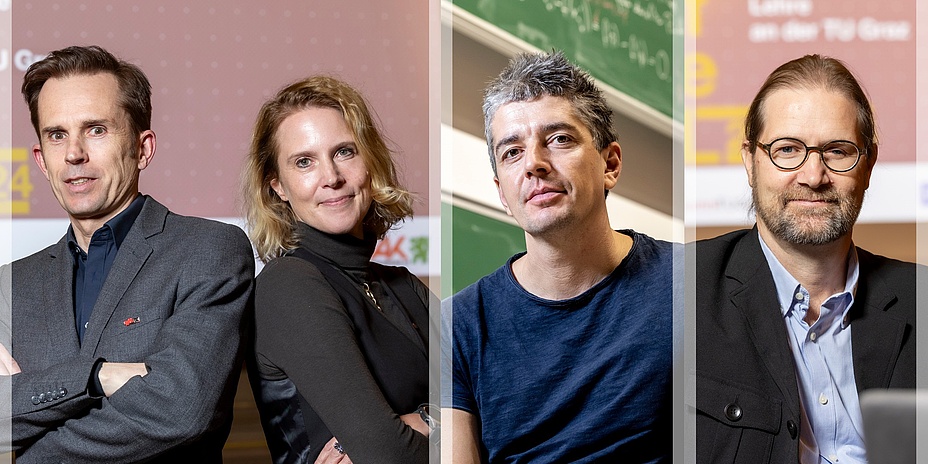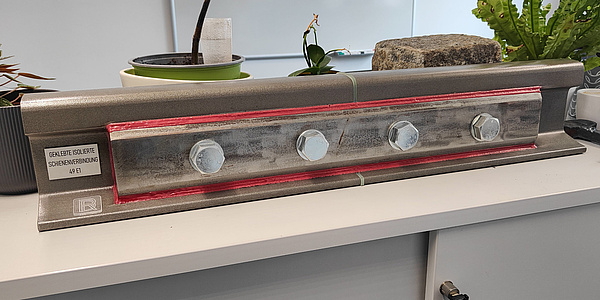Excellence in Teaching at TU Graz

Outstanding teaching is a cornerstone and one of the key objectives of TU Graz. Once a year, our university awards prizes for excellence in teaching in recognition of outstanding courses. In the 2023/24 academic year, the following teaching staff won prizes for their high level of commitment, outstanding didactic concepts and special motivation: Christoph Aistleitner, Lorenz Frühwirth and Athanasios Sourmelidis for the lecture with integrated exercise ‘Analysis 1 für Informatikstudien’ (‘Analysis 1 for computer science studies’), Mario Hirz for the lecture ‘Embedded Mechatronics Architectures’, and Christina Johanna Hopfe and Robert Scot McLeod for the lecture with integrated exercise ‘Low Carbon Building Design and Communities’. Four prizewinners give insights into their teaching in the TU Graz people interview.
How do you organise your teaching in order to convey the content in the best possible way?
Aistleitner: I basically teach in a loud and expansive manner. I try to organise the classes in a discovery-based way, in other words not by just leading the way and dragging the audience behind me, but questioning, searching and meandering. I teach in the classical way, without any frills, standing at the blackboard with a piece of chalk. From time to time I also show a few photos or YouTube videos, typically to paint a broader picture of maths, which is not just a technical subject, but a social activity and human cultural achievement.
Hirz: My courses are mostly offered as traditional lectures in which I actively involve the students in order to arouse their interest and support an effective transfer of knowledge. In addition to teaching the basics and theoretical content, it is important to me to establish links to real and practical applications. In this way, students can put the course content into context with previous knowledge, experience and real systems.
‘It is important to me to establish links to real and practical applications.’
Mario Hirz
Hopfe and McLeod: We begin each lecture with a brief recap of the previous unit. This ensures continuity between lectures and gives students the opportunity to reflect on what they have learnt and ask questions. In this way, we receive formative feedback on the students' progress and can assess how well they have understood the core concepts. We also emphasise the intended learning outcomes before each course. At the end of each unit, we go through them again and conduct a short quiz using the online tool ‘feedbackr’ to assess how well the students have mastered them.
Do you have any tips and tricks for everyday teaching that you can recommend to colleagues?
Aistleitner: I think the right way to teach is a very personal matter and not something that can be passed on via a few ‘tricks’. I occasionally go to didactic training courses (e.g. as part of the Styrian universities' didactics workshop) to spend a few hours reflecting on my teaching. In maths classes, teaching by means of blackboard lectures has been tried and tested for centuries, and I see no reason to incorporate any deviating ‘modern’ didactic elements. However, I use some of TU Graz's online tools very frequently, especially the TU Graz TeachCenter for administration, and streaming and recording via TUbe for large courses (by the way, everything almost always works excellently – my compliments to those responsible!)
‘I use some of TU Graz's online tools very frequently.’
Christoph Aistleitner
Hirz: The in-house training programmes offered by TU Graz for teaching are definitely recommended. There is now a wide range on offer, from basic courses to specialised topics. There is something for everyone.
In recent years, there have been more and more opportunities to use online formats to support teaching. However, the efficient and effective use of these tools depends on various factors, such as personal teaching style, content and structure of the course, and number and previous education of the participating students. In my experience, online tools can certainly be supportive, but shouldn’t completely replace personal contact with students.
Hopfe and McLeod: We believe that students learn best by doing and that all new knowledge must build on previous knowledge. By incorporating interactive elements (e.g. measuring and assessing the building physics of a building), we promote active learning, which enables better retention of information and a deeper understanding of the material.
The virtual and online teaching/learning formats and the supporting materials we provide (e.g. online lecture recordings and web-based learning technologies) improve the in-person contact time and enable students to learn flexibly in terms of time and location. This also means that if they miss a lecture, they can easily catch up on it at any time.
What motivates you in your everyday life as a lecturer at TU Graz?
Aistleitner: According to a common cliché, maths is a dry and boring subject, and for many students this seems to be the experience they bring with them from school. I take great pleasure in debunking this cliché and teaching maths in an emotional and joyful way. One piece of feedback I often get after one or two semesters is: ‘The university gave me a completely new picture of maths, different and more exciting than I could have imagined.’ I really enjoy conveying this ‘surprising’ positive image of maths beyond the purely arithmetic skills.
Hirz: Working with students is highly motivating for me, not only in terms of imparting knowledge, but especially because of the two-way exchange, the discussions and the ongoing learning. I enjoy the challenge of conveying the content of my courses in a way that motivates students to engage with the problems of our time and to scrutinise things critically. If this is successful, I regard active and enthusiastic students as a nice recognition for myself.
‘Our greatest motivation is the students themselves.’
Christina Johanna Hopfe and Robert Scot McLeod
Hopfe and McLeod: Our greatest motivation is the students themselves. As our course is an elective module, this means that students have chosen this course because they have a keen interest in sustainability and the built environment. The course attracts students from all over the world and we had great discussions in the last year as they really engaged with the subject, including on a personal basis by attending additional external lectures and listening to relevant podcasts. It is wonderful to see the progress of our students and to hear from them how they are progressing in their careers.




